Detailed Analysis of Unilever's Global Business Strategy Report
VerifiedAdded on 2020/12/09
|16
|5259
|441
Report
AI Summary
This report provides a comprehensive analysis of Unilever's global business strategy. It begins with an introduction to global business strategy and the chosen company, Unilever. The report then assesses suitable techniques for analyzing the business environment, including PESTLE and Porter's Five Forces models, examining both micro and macro environmental factors. It explores the impact of the international business environment on Unilever, including corporate social responsibility, culture, and political factors. The report also examines the extent of globalization on the organization, discussing its benefits, opportunities, and challenges. Furthermore, it evaluates Unilever's international operations, addressing moral and ethical questions, conflicts between corporate strategy and ethical responsibilities, and relevant legislation. The report concludes with a summary of findings and references.
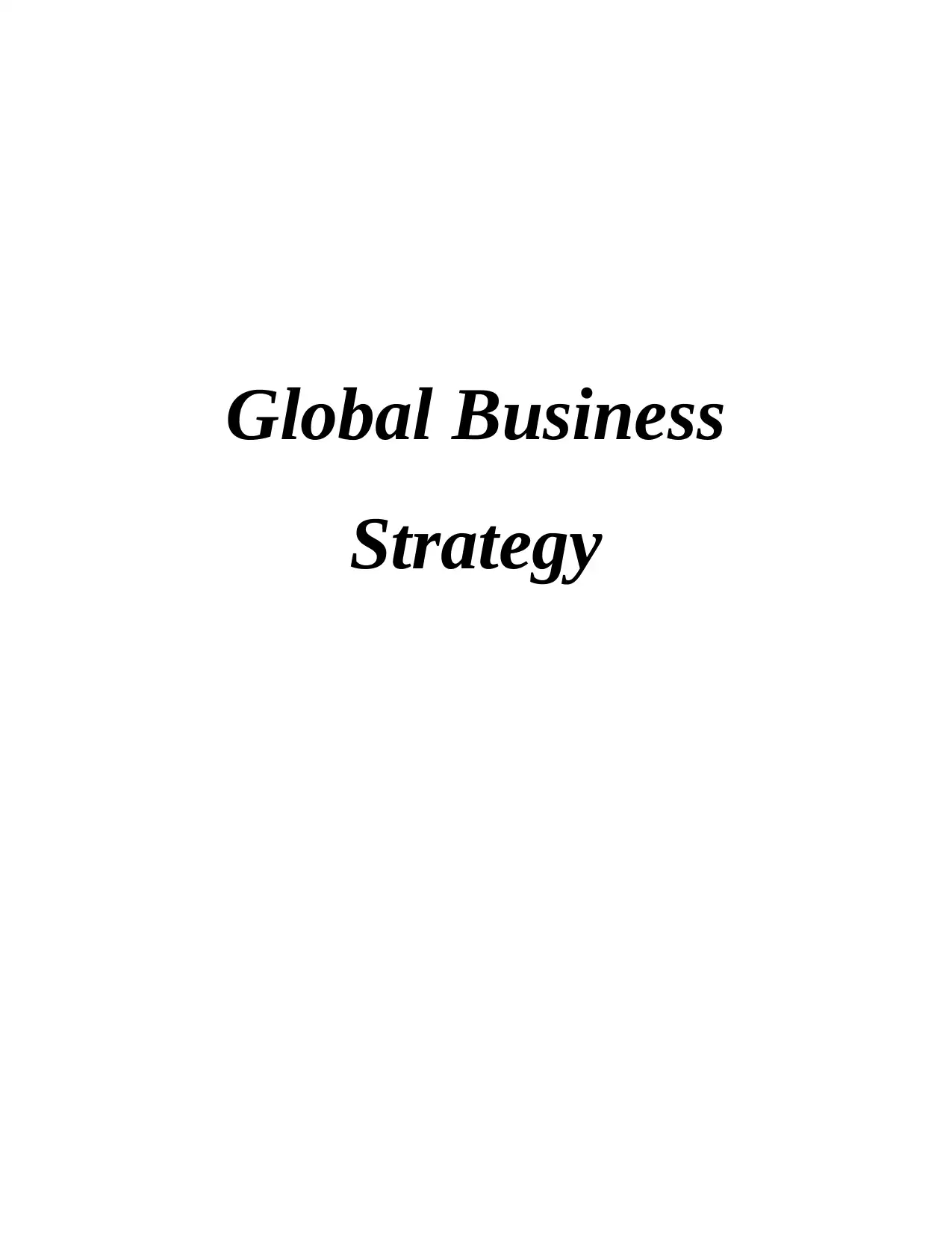
Global Business
Strategy
Strategy
Paraphrase This Document
Need a fresh take? Get an instant paraphrase of this document with our AI Paraphraser
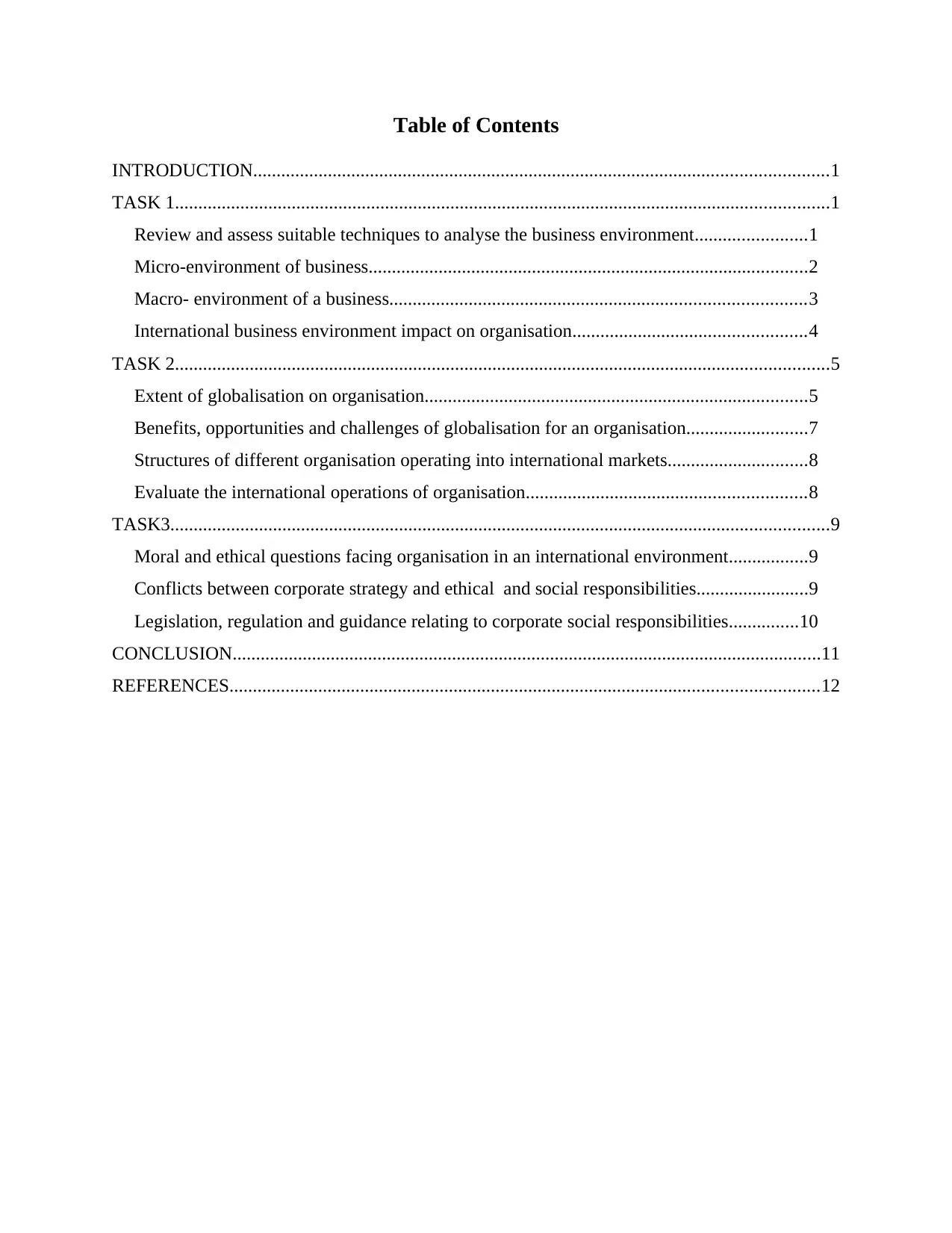
Table of Contents
INTRODUCTION...........................................................................................................................1
TASK 1............................................................................................................................................1
Review and assess suitable techniques to analyse the business environment........................1
Micro-environment of business..............................................................................................2
Macro- environment of a business.........................................................................................3
International business environment impact on organisation..................................................4
TASK 2............................................................................................................................................5
Extent of globalisation on organisation..................................................................................5
Benefits, opportunities and challenges of globalisation for an organisation..........................7
Structures of different organisation operating into international markets..............................8
Evaluate the international operations of organisation............................................................8
TASK3.............................................................................................................................................9
Moral and ethical questions facing organisation in an international environment.................9
Conflicts between corporate strategy and ethical and social responsibilities........................9
Legislation, regulation and guidance relating to corporate social responsibilities...............10
CONCLUSION..............................................................................................................................11
REFERENCES..............................................................................................................................12
INTRODUCTION...........................................................................................................................1
TASK 1............................................................................................................................................1
Review and assess suitable techniques to analyse the business environment........................1
Micro-environment of business..............................................................................................2
Macro- environment of a business.........................................................................................3
International business environment impact on organisation..................................................4
TASK 2............................................................................................................................................5
Extent of globalisation on organisation..................................................................................5
Benefits, opportunities and challenges of globalisation for an organisation..........................7
Structures of different organisation operating into international markets..............................8
Evaluate the international operations of organisation............................................................8
TASK3.............................................................................................................................................9
Moral and ethical questions facing organisation in an international environment.................9
Conflicts between corporate strategy and ethical and social responsibilities........................9
Legislation, regulation and guidance relating to corporate social responsibilities...............10
CONCLUSION..............................................................................................................................11
REFERENCES..............................................................................................................................12
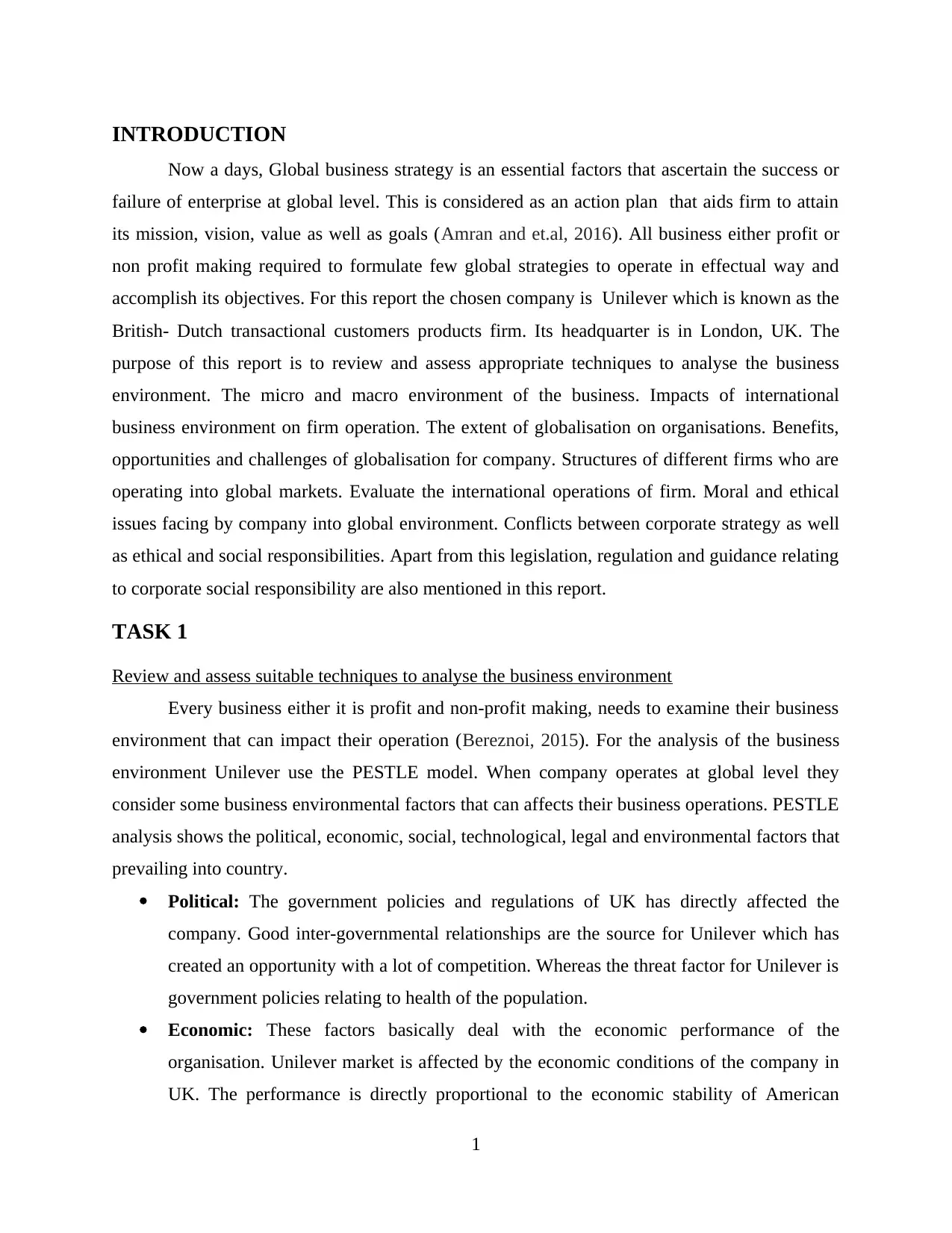
INTRODUCTION
Now a days, Global business strategy is an essential factors that ascertain the success or
failure of enterprise at global level. This is considered as an action plan that aids firm to attain
its mission, vision, value as well as goals (Amran and et.al, 2016). All business either profit or
non profit making required to formulate few global strategies to operate in effectual way and
accomplish its objectives. For this report the chosen company is Unilever which is known as the
British- Dutch transactional customers products firm. Its headquarter is in London, UK. The
purpose of this report is to review and assess appropriate techniques to analyse the business
environment. The micro and macro environment of the business. Impacts of international
business environment on firm operation. The extent of globalisation on organisations. Benefits,
opportunities and challenges of globalisation for company. Structures of different firms who are
operating into global markets. Evaluate the international operations of firm. Moral and ethical
issues facing by company into global environment. Conflicts between corporate strategy as well
as ethical and social responsibilities. Apart from this legislation, regulation and guidance relating
to corporate social responsibility are also mentioned in this report.
TASK 1
Review and assess suitable techniques to analyse the business environment
Every business either it is profit and non-profit making, needs to examine their business
environment that can impact their operation (Bereznoi, 2015). For the analysis of the business
environment Unilever use the PESTLE model. When company operates at global level they
consider some business environmental factors that can affects their business operations. PESTLE
analysis shows the political, economic, social, technological, legal and environmental factors that
prevailing into country.
Political: The government policies and regulations of UK has directly affected the
company. Good inter-governmental relationships are the source for Unilever which has
created an opportunity with a lot of competition. Whereas the threat factor for Unilever is
government policies relating to health of the population.
Economic: These factors basically deal with the economic performance of the
organisation. Unilever market is affected by the economic conditions of the company in
UK. The performance is directly proportional to the economic stability of American
1
Now a days, Global business strategy is an essential factors that ascertain the success or
failure of enterprise at global level. This is considered as an action plan that aids firm to attain
its mission, vision, value as well as goals (Amran and et.al, 2016). All business either profit or
non profit making required to formulate few global strategies to operate in effectual way and
accomplish its objectives. For this report the chosen company is Unilever which is known as the
British- Dutch transactional customers products firm. Its headquarter is in London, UK. The
purpose of this report is to review and assess appropriate techniques to analyse the business
environment. The micro and macro environment of the business. Impacts of international
business environment on firm operation. The extent of globalisation on organisations. Benefits,
opportunities and challenges of globalisation for company. Structures of different firms who are
operating into global markets. Evaluate the international operations of firm. Moral and ethical
issues facing by company into global environment. Conflicts between corporate strategy as well
as ethical and social responsibilities. Apart from this legislation, regulation and guidance relating
to corporate social responsibility are also mentioned in this report.
TASK 1
Review and assess suitable techniques to analyse the business environment
Every business either it is profit and non-profit making, needs to examine their business
environment that can impact their operation (Bereznoi, 2015). For the analysis of the business
environment Unilever use the PESTLE model. When company operates at global level they
consider some business environmental factors that can affects their business operations. PESTLE
analysis shows the political, economic, social, technological, legal and environmental factors that
prevailing into country.
Political: The government policies and regulations of UK has directly affected the
company. Good inter-governmental relationships are the source for Unilever which has
created an opportunity with a lot of competition. Whereas the threat factor for Unilever is
government policies relating to health of the population.
Economic: These factors basically deal with the economic performance of the
organisation. Unilever market is affected by the economic conditions of the company in
UK. The performance is directly proportional to the economic stability of American
1
⊘ This is a preview!⊘
Do you want full access?
Subscribe today to unlock all pages.

Trusted by 1+ million students worldwide
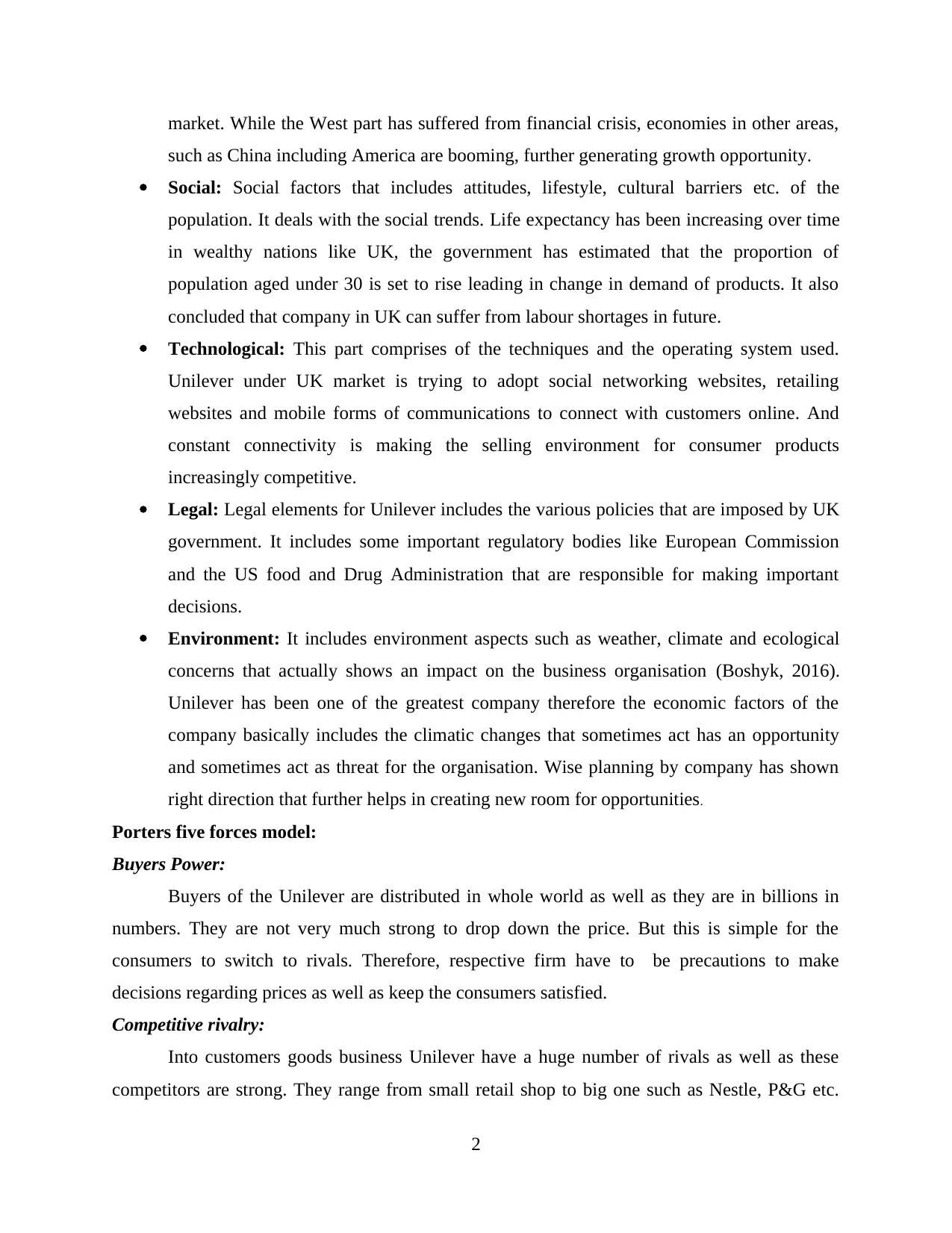
market. While the West part has suffered from financial crisis, economies in other areas,
such as China including America are booming, further generating growth opportunity.
Social: Social factors that includes attitudes, lifestyle, cultural barriers etc. of the
population. It deals with the social trends. Life expectancy has been increasing over time
in wealthy nations like UK, the government has estimated that the proportion of
population aged under 30 is set to rise leading in change in demand of products. It also
concluded that company in UK can suffer from labour shortages in future.
Technological: This part comprises of the techniques and the operating system used.
Unilever under UK market is trying to adopt social networking websites, retailing
websites and mobile forms of communications to connect with customers online. And
constant connectivity is making the selling environment for consumer products
increasingly competitive.
Legal: Legal elements for Unilever includes the various policies that are imposed by UK
government. It includes some important regulatory bodies like European Commission
and the US food and Drug Administration that are responsible for making important
decisions.
Environment: It includes environment aspects such as weather, climate and ecological
concerns that actually shows an impact on the business organisation (Boshyk, 2016).
Unilever has been one of the greatest company therefore the economic factors of the
company basically includes the climatic changes that sometimes act has an opportunity
and sometimes act as threat for the organisation. Wise planning by company has shown
right direction that further helps in creating new room for opportunities.
Porters five forces model:
Buyers Power:
Buyers of the Unilever are distributed in whole world as well as they are in billions in
numbers. They are not very much strong to drop down the price. But this is simple for the
consumers to switch to rivals. Therefore, respective firm have to be precautions to make
decisions regarding prices as well as keep the consumers satisfied.
Competitive rivalry:
Into customers goods business Unilever have a huge number of rivals as well as these
competitors are strong. They range from small retail shop to big one such as Nestle, P&G etc.
2
such as China including America are booming, further generating growth opportunity.
Social: Social factors that includes attitudes, lifestyle, cultural barriers etc. of the
population. It deals with the social trends. Life expectancy has been increasing over time
in wealthy nations like UK, the government has estimated that the proportion of
population aged under 30 is set to rise leading in change in demand of products. It also
concluded that company in UK can suffer from labour shortages in future.
Technological: This part comprises of the techniques and the operating system used.
Unilever under UK market is trying to adopt social networking websites, retailing
websites and mobile forms of communications to connect with customers online. And
constant connectivity is making the selling environment for consumer products
increasingly competitive.
Legal: Legal elements for Unilever includes the various policies that are imposed by UK
government. It includes some important regulatory bodies like European Commission
and the US food and Drug Administration that are responsible for making important
decisions.
Environment: It includes environment aspects such as weather, climate and ecological
concerns that actually shows an impact on the business organisation (Boshyk, 2016).
Unilever has been one of the greatest company therefore the economic factors of the
company basically includes the climatic changes that sometimes act has an opportunity
and sometimes act as threat for the organisation. Wise planning by company has shown
right direction that further helps in creating new room for opportunities.
Porters five forces model:
Buyers Power:
Buyers of the Unilever are distributed in whole world as well as they are in billions in
numbers. They are not very much strong to drop down the price. But this is simple for the
consumers to switch to rivals. Therefore, respective firm have to be precautions to make
decisions regarding prices as well as keep the consumers satisfied.
Competitive rivalry:
Into customers goods business Unilever have a huge number of rivals as well as these
competitors are strong. They range from small retail shop to big one such as Nestle, P&G etc.
2
Paraphrase This Document
Need a fresh take? Get an instant paraphrase of this document with our AI Paraphraser
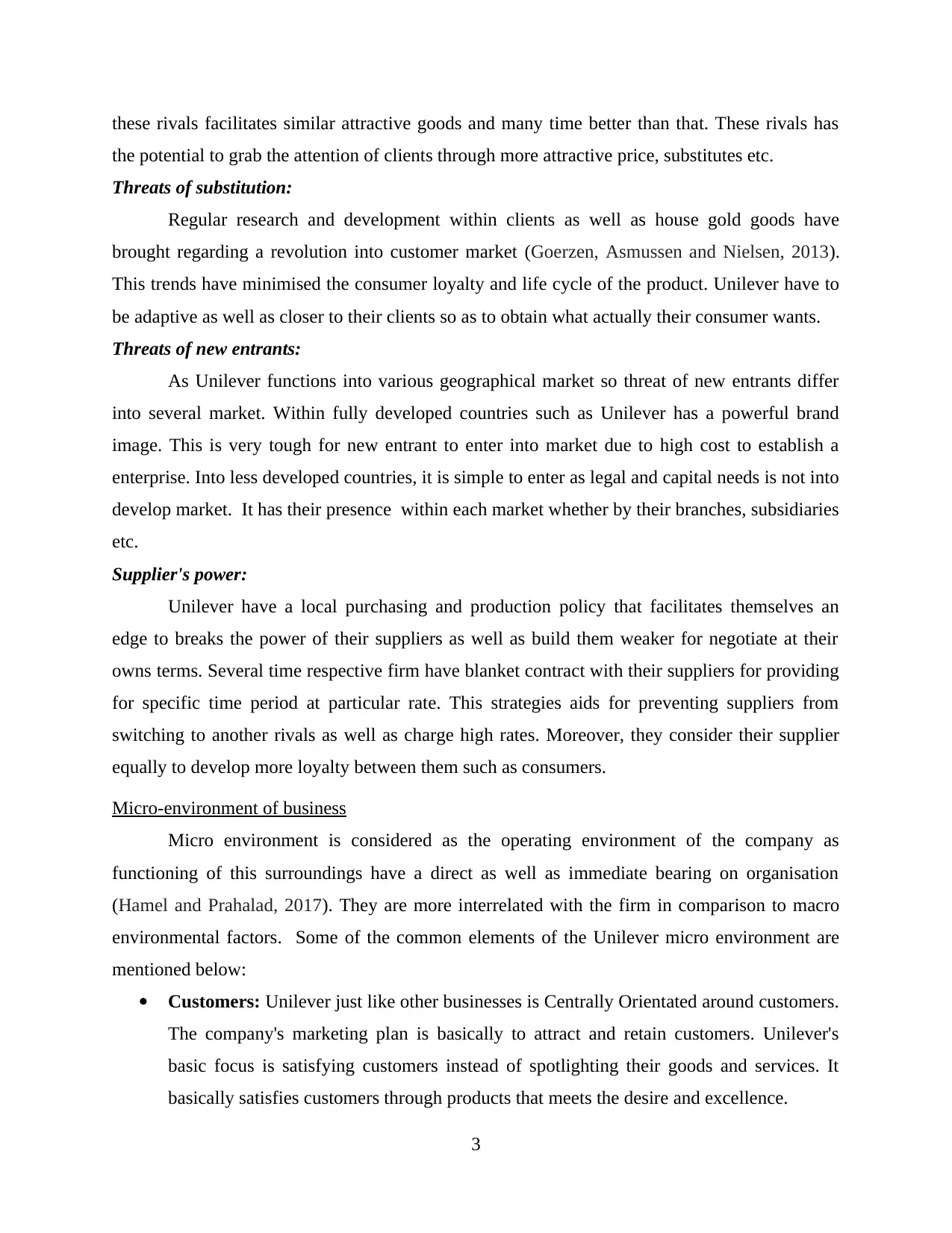
these rivals facilitates similar attractive goods and many time better than that. These rivals has
the potential to grab the attention of clients through more attractive price, substitutes etc.
Threats of substitution:
Regular research and development within clients as well as house gold goods have
brought regarding a revolution into customer market (Goerzen, Asmussen and Nielsen, 2013).
This trends have minimised the consumer loyalty and life cycle of the product. Unilever have to
be adaptive as well as closer to their clients so as to obtain what actually their consumer wants.
Threats of new entrants:
As Unilever functions into various geographical market so threat of new entrants differ
into several market. Within fully developed countries such as Unilever has a powerful brand
image. This is very tough for new entrant to enter into market due to high cost to establish a
enterprise. Into less developed countries, it is simple to enter as legal and capital needs is not into
develop market. It has their presence within each market whether by their branches, subsidiaries
etc.
Supplier's power:
Unilever have a local purchasing and production policy that facilitates themselves an
edge to breaks the power of their suppliers as well as build them weaker for negotiate at their
owns terms. Several time respective firm have blanket contract with their suppliers for providing
for specific time period at particular rate. This strategies aids for preventing suppliers from
switching to another rivals as well as charge high rates. Moreover, they consider their supplier
equally to develop more loyalty between them such as consumers.
Micro-environment of business
Micro environment is considered as the operating environment of the company as
functioning of this surroundings have a direct as well as immediate bearing on organisation
(Hamel and Prahalad, 2017). They are more interrelated with the firm in comparison to macro
environmental factors. Some of the common elements of the Unilever micro environment are
mentioned below:
Customers: Unilever just like other businesses is Centrally Orientated around customers.
The company's marketing plan is basically to attract and retain customers. Unilever's
basic focus is satisfying customers instead of spotlighting their goods and services. It
basically satisfies customers through products that meets the desire and excellence.
3
the potential to grab the attention of clients through more attractive price, substitutes etc.
Threats of substitution:
Regular research and development within clients as well as house gold goods have
brought regarding a revolution into customer market (Goerzen, Asmussen and Nielsen, 2013).
This trends have minimised the consumer loyalty and life cycle of the product. Unilever have to
be adaptive as well as closer to their clients so as to obtain what actually their consumer wants.
Threats of new entrants:
As Unilever functions into various geographical market so threat of new entrants differ
into several market. Within fully developed countries such as Unilever has a powerful brand
image. This is very tough for new entrant to enter into market due to high cost to establish a
enterprise. Into less developed countries, it is simple to enter as legal and capital needs is not into
develop market. It has their presence within each market whether by their branches, subsidiaries
etc.
Supplier's power:
Unilever have a local purchasing and production policy that facilitates themselves an
edge to breaks the power of their suppliers as well as build them weaker for negotiate at their
owns terms. Several time respective firm have blanket contract with their suppliers for providing
for specific time period at particular rate. This strategies aids for preventing suppliers from
switching to another rivals as well as charge high rates. Moreover, they consider their supplier
equally to develop more loyalty between them such as consumers.
Micro-environment of business
Micro environment is considered as the operating environment of the company as
functioning of this surroundings have a direct as well as immediate bearing on organisation
(Hamel and Prahalad, 2017). They are more interrelated with the firm in comparison to macro
environmental factors. Some of the common elements of the Unilever micro environment are
mentioned below:
Customers: Unilever just like other businesses is Centrally Orientated around customers.
The company's marketing plan is basically to attract and retain customers. Unilever's
basic focus is satisfying customers instead of spotlighting their goods and services. It
basically satisfies customers through products that meets the desire and excellence.
3
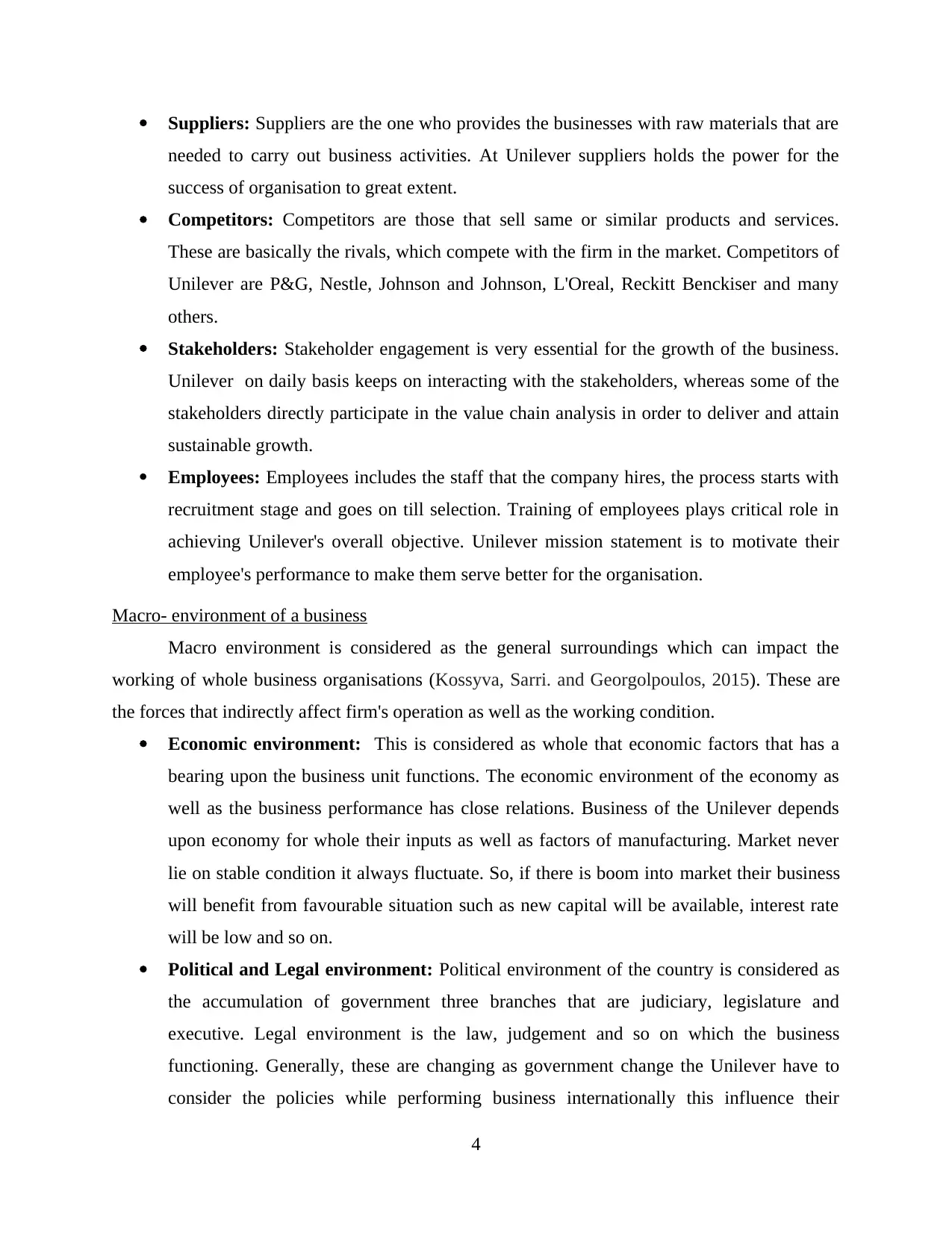
Suppliers: Suppliers are the one who provides the businesses with raw materials that are
needed to carry out business activities. At Unilever suppliers holds the power for the
success of organisation to great extent.
Competitors: Competitors are those that sell same or similar products and services.
These are basically the rivals, which compete with the firm in the market. Competitors of
Unilever are P&G, Nestle, Johnson and Johnson, L'Oreal, Reckitt Benckiser and many
others.
Stakeholders: Stakeholder engagement is very essential for the growth of the business.
Unilever on daily basis keeps on interacting with the stakeholders, whereas some of the
stakeholders directly participate in the value chain analysis in order to deliver and attain
sustainable growth.
Employees: Employees includes the staff that the company hires, the process starts with
recruitment stage and goes on till selection. Training of employees plays critical role in
achieving Unilever's overall objective. Unilever mission statement is to motivate their
employee's performance to make them serve better for the organisation.
Macro- environment of a business
Macro environment is considered as the general surroundings which can impact the
working of whole business organisations (Kossyva, Sarri. and Georgolpoulos, 2015). These are
the forces that indirectly affect firm's operation as well as the working condition.
Economic environment: This is considered as whole that economic factors that has a
bearing upon the business unit functions. The economic environment of the economy as
well as the business performance has close relations. Business of the Unilever depends
upon economy for whole their inputs as well as factors of manufacturing. Market never
lie on stable condition it always fluctuate. So, if there is boom into market their business
will benefit from favourable situation such as new capital will be available, interest rate
will be low and so on.
Political and Legal environment: Political environment of the country is considered as
the accumulation of government three branches that are judiciary, legislature and
executive. Legal environment is the law, judgement and so on which the business
functioning. Generally, these are changing as government change the Unilever have to
consider the policies while performing business internationally this influence their
4
needed to carry out business activities. At Unilever suppliers holds the power for the
success of organisation to great extent.
Competitors: Competitors are those that sell same or similar products and services.
These are basically the rivals, which compete with the firm in the market. Competitors of
Unilever are P&G, Nestle, Johnson and Johnson, L'Oreal, Reckitt Benckiser and many
others.
Stakeholders: Stakeholder engagement is very essential for the growth of the business.
Unilever on daily basis keeps on interacting with the stakeholders, whereas some of the
stakeholders directly participate in the value chain analysis in order to deliver and attain
sustainable growth.
Employees: Employees includes the staff that the company hires, the process starts with
recruitment stage and goes on till selection. Training of employees plays critical role in
achieving Unilever's overall objective. Unilever mission statement is to motivate their
employee's performance to make them serve better for the organisation.
Macro- environment of a business
Macro environment is considered as the general surroundings which can impact the
working of whole business organisations (Kossyva, Sarri. and Georgolpoulos, 2015). These are
the forces that indirectly affect firm's operation as well as the working condition.
Economic environment: This is considered as whole that economic factors that has a
bearing upon the business unit functions. The economic environment of the economy as
well as the business performance has close relations. Business of the Unilever depends
upon economy for whole their inputs as well as factors of manufacturing. Market never
lie on stable condition it always fluctuate. So, if there is boom into market their business
will benefit from favourable situation such as new capital will be available, interest rate
will be low and so on.
Political and Legal environment: Political environment of the country is considered as
the accumulation of government three branches that are judiciary, legislature and
executive. Legal environment is the law, judgement and so on which the business
functioning. Generally, these are changing as government change the Unilever have to
consider the policies while performing business internationally this influence their
4
⊘ This is a preview!⊘
Do you want full access?
Subscribe today to unlock all pages.

Trusted by 1+ million students worldwide
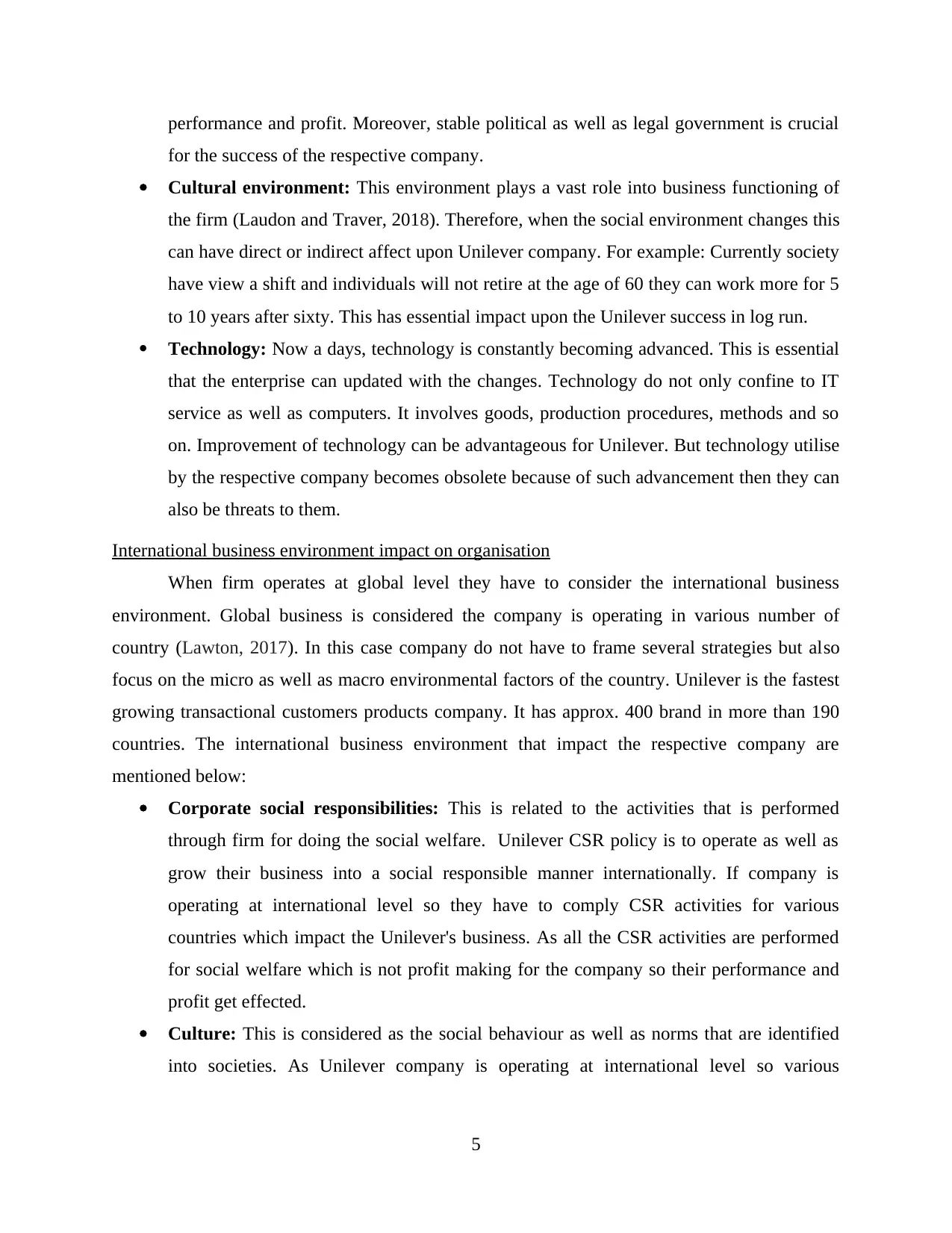
performance and profit. Moreover, stable political as well as legal government is crucial
for the success of the respective company.
Cultural environment: This environment plays a vast role into business functioning of
the firm (Laudon and Traver, 2018). Therefore, when the social environment changes this
can have direct or indirect affect upon Unilever company. For example: Currently society
have view a shift and individuals will not retire at the age of 60 they can work more for 5
to 10 years after sixty. This has essential impact upon the Unilever success in log run.
Technology: Now a days, technology is constantly becoming advanced. This is essential
that the enterprise can updated with the changes. Technology do not only confine to IT
service as well as computers. It involves goods, production procedures, methods and so
on. Improvement of technology can be advantageous for Unilever. But technology utilise
by the respective company becomes obsolete because of such advancement then they can
also be threats to them.
International business environment impact on organisation
When firm operates at global level they have to consider the international business
environment. Global business is considered the company is operating in various number of
country (Lawton, 2017). In this case company do not have to frame several strategies but also
focus on the micro as well as macro environmental factors of the country. Unilever is the fastest
growing transactional customers products company. It has approx. 400 brand in more than 190
countries. The international business environment that impact the respective company are
mentioned below:
Corporate social responsibilities: This is related to the activities that is performed
through firm for doing the social welfare. Unilever CSR policy is to operate as well as
grow their business into a social responsible manner internationally. If company is
operating at international level so they have to comply CSR activities for various
countries which impact the Unilever's business. As all the CSR activities are performed
for social welfare which is not profit making for the company so their performance and
profit get effected.
Culture: This is considered as the social behaviour as well as norms that are identified
into societies. As Unilever company is operating at international level so various
5
for the success of the respective company.
Cultural environment: This environment plays a vast role into business functioning of
the firm (Laudon and Traver, 2018). Therefore, when the social environment changes this
can have direct or indirect affect upon Unilever company. For example: Currently society
have view a shift and individuals will not retire at the age of 60 they can work more for 5
to 10 years after sixty. This has essential impact upon the Unilever success in log run.
Technology: Now a days, technology is constantly becoming advanced. This is essential
that the enterprise can updated with the changes. Technology do not only confine to IT
service as well as computers. It involves goods, production procedures, methods and so
on. Improvement of technology can be advantageous for Unilever. But technology utilise
by the respective company becomes obsolete because of such advancement then they can
also be threats to them.
International business environment impact on organisation
When firm operates at global level they have to consider the international business
environment. Global business is considered the company is operating in various number of
country (Lawton, 2017). In this case company do not have to frame several strategies but also
focus on the micro as well as macro environmental factors of the country. Unilever is the fastest
growing transactional customers products company. It has approx. 400 brand in more than 190
countries. The international business environment that impact the respective company are
mentioned below:
Corporate social responsibilities: This is related to the activities that is performed
through firm for doing the social welfare. Unilever CSR policy is to operate as well as
grow their business into a social responsible manner internationally. If company is
operating at international level so they have to comply CSR activities for various
countries which impact the Unilever's business. As all the CSR activities are performed
for social welfare which is not profit making for the company so their performance and
profit get effected.
Culture: This is considered as the social behaviour as well as norms that are identified
into societies. As Unilever company is operating at international level so various
5
Paraphrase This Document
Need a fresh take? Get an instant paraphrase of this document with our AI Paraphraser
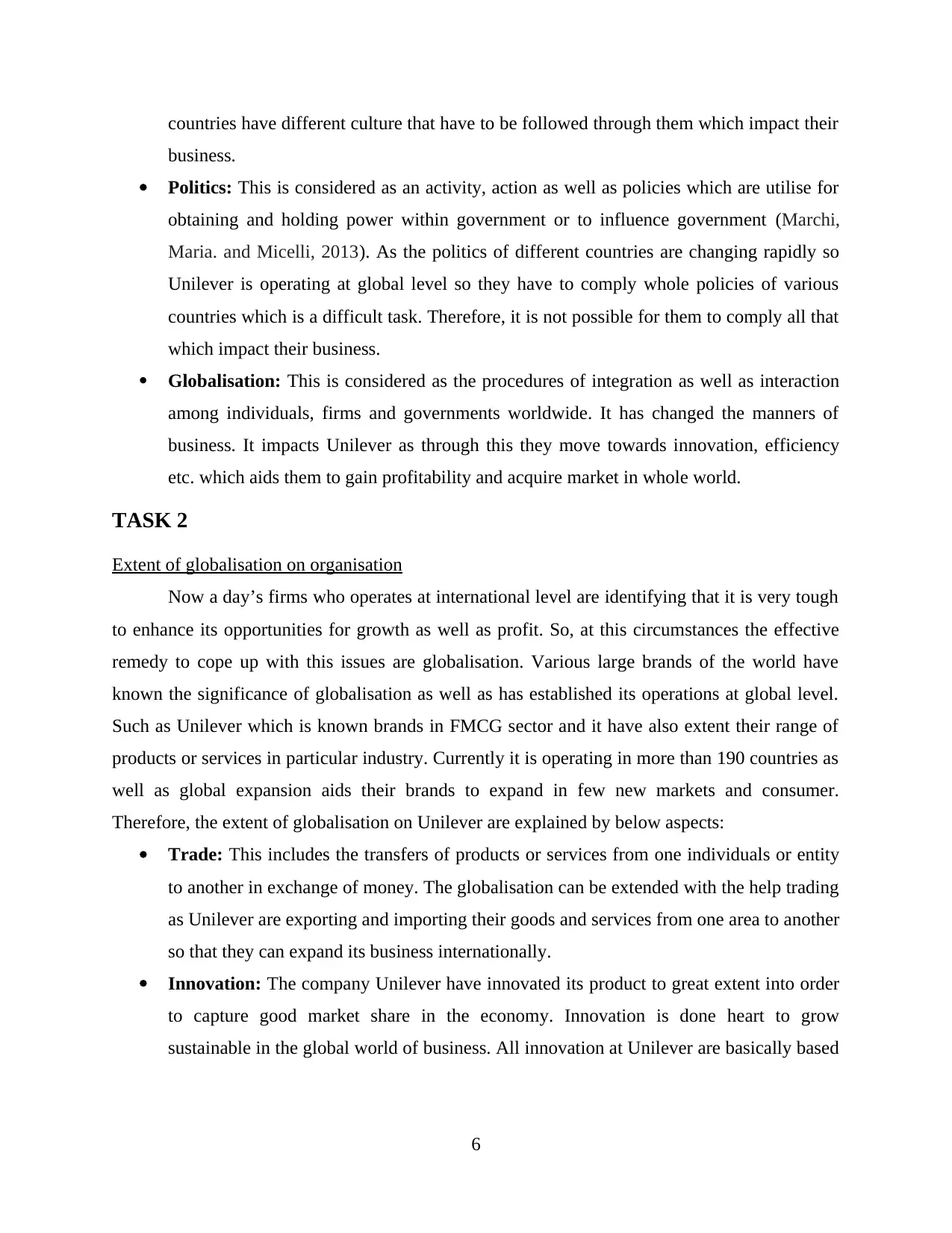
countries have different culture that have to be followed through them which impact their
business.
Politics: This is considered as an activity, action as well as policies which are utilise for
obtaining and holding power within government or to influence government (Marchi,
Maria. and Micelli, 2013). As the politics of different countries are changing rapidly so
Unilever is operating at global level so they have to comply whole policies of various
countries which is a difficult task. Therefore, it is not possible for them to comply all that
which impact their business.
Globalisation: This is considered as the procedures of integration as well as interaction
among individuals, firms and governments worldwide. It has changed the manners of
business. It impacts Unilever as through this they move towards innovation, efficiency
etc. which aids them to gain profitability and acquire market in whole world.
TASK 2
Extent of globalisation on organisation
Now a day’s firms who operates at international level are identifying that it is very tough
to enhance its opportunities for growth as well as profit. So, at this circumstances the effective
remedy to cope up with this issues are globalisation. Various large brands of the world have
known the significance of globalisation as well as has established its operations at global level.
Such as Unilever which is known brands in FMCG sector and it have also extent their range of
products or services in particular industry. Currently it is operating in more than 190 countries as
well as global expansion aids their brands to expand in few new markets and consumer.
Therefore, the extent of globalisation on Unilever are explained by below aspects:
Trade: This includes the transfers of products or services from one individuals or entity
to another in exchange of money. The globalisation can be extended with the help trading
as Unilever are exporting and importing their goods and services from one area to another
so that they can expand its business internationally.
Innovation: The company Unilever have innovated its product to great extent into order
to capture good market share in the economy. Innovation is done heart to grow
sustainable in the global world of business. All innovation at Unilever are basically based
6
business.
Politics: This is considered as an activity, action as well as policies which are utilise for
obtaining and holding power within government or to influence government (Marchi,
Maria. and Micelli, 2013). As the politics of different countries are changing rapidly so
Unilever is operating at global level so they have to comply whole policies of various
countries which is a difficult task. Therefore, it is not possible for them to comply all that
which impact their business.
Globalisation: This is considered as the procedures of integration as well as interaction
among individuals, firms and governments worldwide. It has changed the manners of
business. It impacts Unilever as through this they move towards innovation, efficiency
etc. which aids them to gain profitability and acquire market in whole world.
TASK 2
Extent of globalisation on organisation
Now a day’s firms who operates at international level are identifying that it is very tough
to enhance its opportunities for growth as well as profit. So, at this circumstances the effective
remedy to cope up with this issues are globalisation. Various large brands of the world have
known the significance of globalisation as well as has established its operations at global level.
Such as Unilever which is known brands in FMCG sector and it have also extent their range of
products or services in particular industry. Currently it is operating in more than 190 countries as
well as global expansion aids their brands to expand in few new markets and consumer.
Therefore, the extent of globalisation on Unilever are explained by below aspects:
Trade: This includes the transfers of products or services from one individuals or entity
to another in exchange of money. The globalisation can be extended with the help trading
as Unilever are exporting and importing their goods and services from one area to another
so that they can expand its business internationally.
Innovation: The company Unilever have innovated its product to great extent into order
to capture good market share in the economy. Innovation is done heart to grow
sustainable in the global world of business. All innovation at Unilever are basically based
6
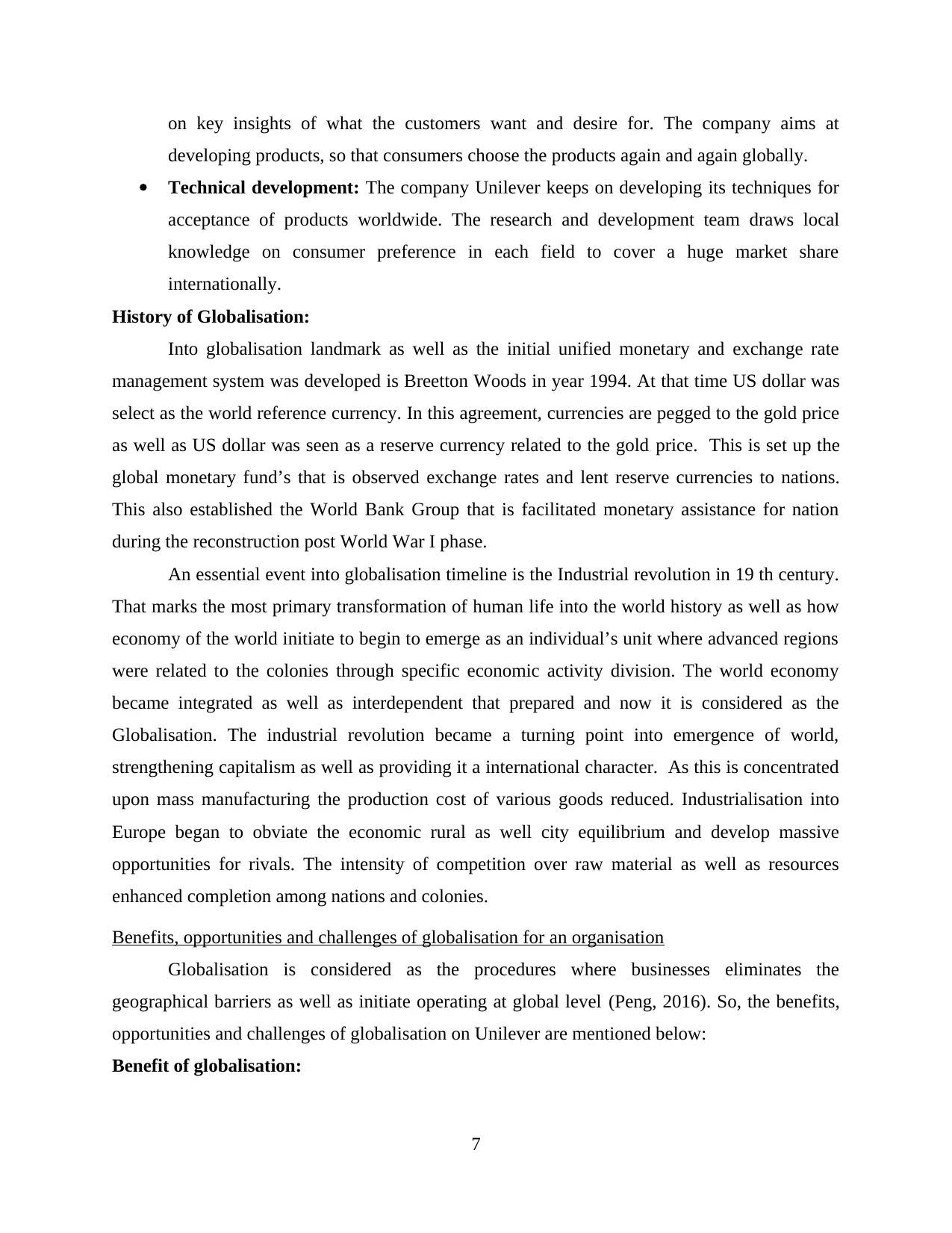
on key insights of what the customers want and desire for. The company aims at
developing products, so that consumers choose the products again and again globally.
Technical development: The company Unilever keeps on developing its techniques for
acceptance of products worldwide. The research and development team draws local
knowledge on consumer preference in each field to cover a huge market share
internationally.
History of Globalisation:
Into globalisation landmark as well as the initial unified monetary and exchange rate
management system was developed is Breetton Woods in year 1994. At that time US dollar was
select as the world reference currency. In this agreement, currencies are pegged to the gold price
as well as US dollar was seen as a reserve currency related to the gold price. This is set up the
global monetary fund’s that is observed exchange rates and lent reserve currencies to nations.
This also established the World Bank Group that is facilitated monetary assistance for nation
during the reconstruction post World War I phase.
An essential event into globalisation timeline is the Industrial revolution in 19 th century.
That marks the most primary transformation of human life into the world history as well as how
economy of the world initiate to begin to emerge as an individual’s unit where advanced regions
were related to the colonies through specific economic activity division. The world economy
became integrated as well as interdependent that prepared and now it is considered as the
Globalisation. The industrial revolution became a turning point into emergence of world,
strengthening capitalism as well as providing it a international character. As this is concentrated
upon mass manufacturing the production cost of various goods reduced. Industrialisation into
Europe began to obviate the economic rural as well city equilibrium and develop massive
opportunities for rivals. The intensity of competition over raw material as well as resources
enhanced completion among nations and colonies.
Benefits, opportunities and challenges of globalisation for an organisation
Globalisation is considered as the procedures where businesses eliminates the
geographical barriers as well as initiate operating at global level (Peng, 2016). So, the benefits,
opportunities and challenges of globalisation on Unilever are mentioned below:
Benefit of globalisation:
7
developing products, so that consumers choose the products again and again globally.
Technical development: The company Unilever keeps on developing its techniques for
acceptance of products worldwide. The research and development team draws local
knowledge on consumer preference in each field to cover a huge market share
internationally.
History of Globalisation:
Into globalisation landmark as well as the initial unified monetary and exchange rate
management system was developed is Breetton Woods in year 1994. At that time US dollar was
select as the world reference currency. In this agreement, currencies are pegged to the gold price
as well as US dollar was seen as a reserve currency related to the gold price. This is set up the
global monetary fund’s that is observed exchange rates and lent reserve currencies to nations.
This also established the World Bank Group that is facilitated monetary assistance for nation
during the reconstruction post World War I phase.
An essential event into globalisation timeline is the Industrial revolution in 19 th century.
That marks the most primary transformation of human life into the world history as well as how
economy of the world initiate to begin to emerge as an individual’s unit where advanced regions
were related to the colonies through specific economic activity division. The world economy
became integrated as well as interdependent that prepared and now it is considered as the
Globalisation. The industrial revolution became a turning point into emergence of world,
strengthening capitalism as well as providing it a international character. As this is concentrated
upon mass manufacturing the production cost of various goods reduced. Industrialisation into
Europe began to obviate the economic rural as well city equilibrium and develop massive
opportunities for rivals. The intensity of competition over raw material as well as resources
enhanced completion among nations and colonies.
Benefits, opportunities and challenges of globalisation for an organisation
Globalisation is considered as the procedures where businesses eliminates the
geographical barriers as well as initiate operating at global level (Peng, 2016). So, the benefits,
opportunities and challenges of globalisation on Unilever are mentioned below:
Benefit of globalisation:
7
⊘ This is a preview!⊘
Do you want full access?
Subscribe today to unlock all pages.

Trusted by 1+ million students worldwide
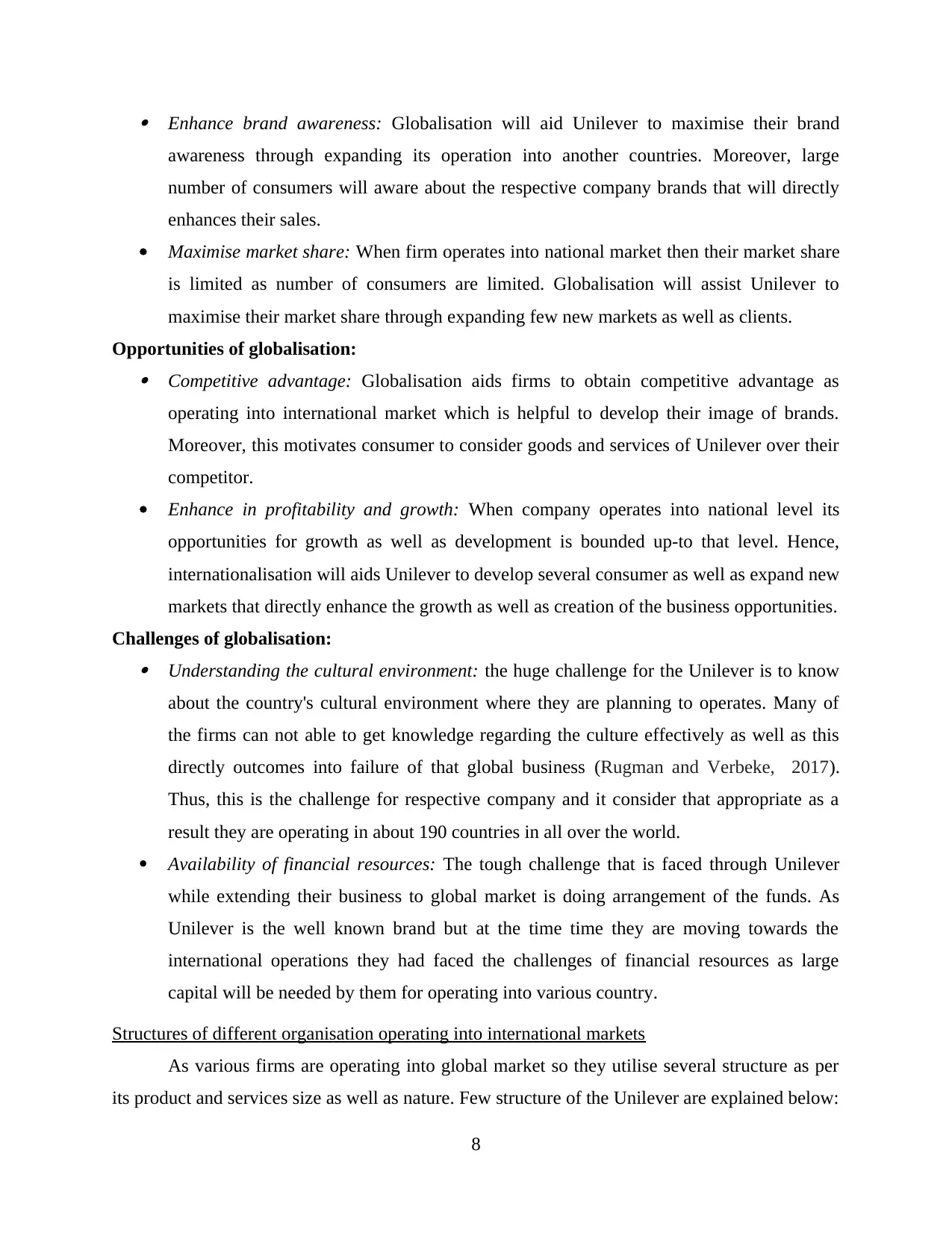
Enhance brand awareness: Globalisation will aid Unilever to maximise their brand
awareness through expanding its operation into another countries. Moreover, large
number of consumers will aware about the respective company brands that will directly
enhances their sales.
Maximise market share: When firm operates into national market then their market share
is limited as number of consumers are limited. Globalisation will assist Unilever to
maximise their market share through expanding few new markets as well as clients.
Opportunities of globalisation: Competitive advantage: Globalisation aids firms to obtain competitive advantage as
operating into international market which is helpful to develop their image of brands.
Moreover, this motivates consumer to consider goods and services of Unilever over their
competitor.
Enhance in profitability and growth: When company operates into national level its
opportunities for growth as well as development is bounded up-to that level. Hence,
internationalisation will aids Unilever to develop several consumer as well as expand new
markets that directly enhance the growth as well as creation of the business opportunities.
Challenges of globalisation: Understanding the cultural environment: the huge challenge for the Unilever is to know
about the country's cultural environment where they are planning to operates. Many of
the firms can not able to get knowledge regarding the culture effectively as well as this
directly outcomes into failure of that global business (Rugman and Verbeke, 2017).
Thus, this is the challenge for respective company and it consider that appropriate as a
result they are operating in about 190 countries in all over the world.
Availability of financial resources: The tough challenge that is faced through Unilever
while extending their business to global market is doing arrangement of the funds. As
Unilever is the well known brand but at the time time they are moving towards the
international operations they had faced the challenges of financial resources as large
capital will be needed by them for operating into various country.
Structures of different organisation operating into international markets
As various firms are operating into global market so they utilise several structure as per
its product and services size as well as nature. Few structure of the Unilever are explained below:
8
awareness through expanding its operation into another countries. Moreover, large
number of consumers will aware about the respective company brands that will directly
enhances their sales.
Maximise market share: When firm operates into national market then their market share
is limited as number of consumers are limited. Globalisation will assist Unilever to
maximise their market share through expanding few new markets as well as clients.
Opportunities of globalisation: Competitive advantage: Globalisation aids firms to obtain competitive advantage as
operating into international market which is helpful to develop their image of brands.
Moreover, this motivates consumer to consider goods and services of Unilever over their
competitor.
Enhance in profitability and growth: When company operates into national level its
opportunities for growth as well as development is bounded up-to that level. Hence,
internationalisation will aids Unilever to develop several consumer as well as expand new
markets that directly enhance the growth as well as creation of the business opportunities.
Challenges of globalisation: Understanding the cultural environment: the huge challenge for the Unilever is to know
about the country's cultural environment where they are planning to operates. Many of
the firms can not able to get knowledge regarding the culture effectively as well as this
directly outcomes into failure of that global business (Rugman and Verbeke, 2017).
Thus, this is the challenge for respective company and it consider that appropriate as a
result they are operating in about 190 countries in all over the world.
Availability of financial resources: The tough challenge that is faced through Unilever
while extending their business to global market is doing arrangement of the funds. As
Unilever is the well known brand but at the time time they are moving towards the
international operations they had faced the challenges of financial resources as large
capital will be needed by them for operating into various country.
Structures of different organisation operating into international markets
As various firms are operating into global market so they utilise several structure as per
its product and services size as well as nature. Few structure of the Unilever are explained below:
8
Paraphrase This Document
Need a fresh take? Get an instant paraphrase of this document with our AI Paraphraser
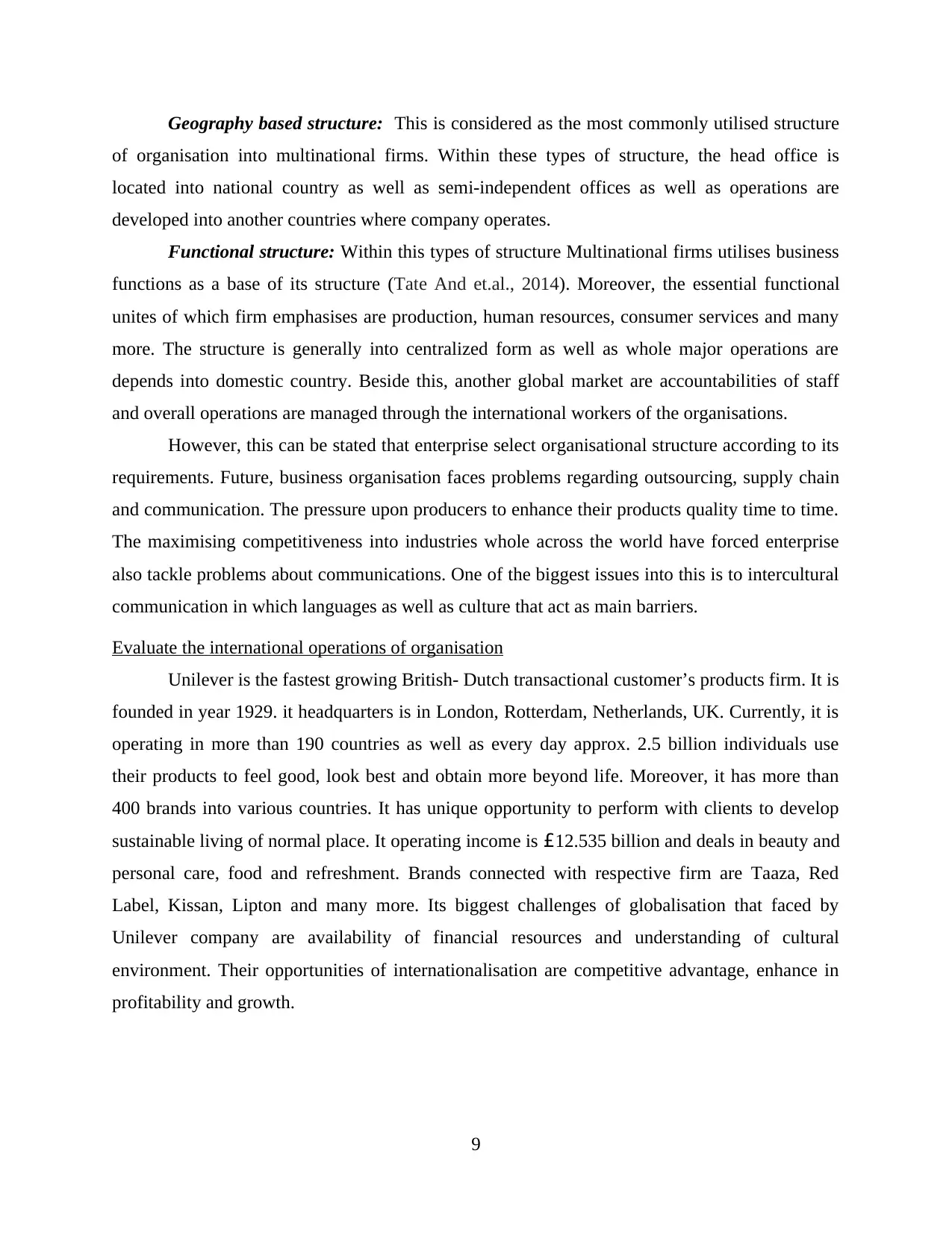
Geography based structure: This is considered as the most commonly utilised structure
of organisation into multinational firms. Within these types of structure, the head office is
located into national country as well as semi-independent offices as well as operations are
developed into another countries where company operates.
Functional structure: Within this types of structure Multinational firms utilises business
functions as a base of its structure (Tate And et.al., 2014). Moreover, the essential functional
unites of which firm emphasises are production, human resources, consumer services and many
more. The structure is generally into centralized form as well as whole major operations are
depends into domestic country. Beside this, another global market are accountabilities of staff
and overall operations are managed through the international workers of the organisations.
However, this can be stated that enterprise select organisational structure according to its
requirements. Future, business organisation faces problems regarding outsourcing, supply chain
and communication. The pressure upon producers to enhance their products quality time to time.
The maximising competitiveness into industries whole across the world have forced enterprise
also tackle problems about communications. One of the biggest issues into this is to intercultural
communication in which languages as well as culture that act as main barriers.
Evaluate the international operations of organisation
Unilever is the fastest growing British- Dutch transactional customer’s products firm. It is
founded in year 1929. it headquarters is in London, Rotterdam, Netherlands, UK. Currently, it is
operating in more than 190 countries as well as every day approx. 2.5 billion individuals use
their products to feel good, look best and obtain more beyond life. Moreover, it has more than
400 brands into various countries. It has unique opportunity to perform with clients to develop
sustainable living of normal place. It operating income is £12.535 billion and deals in beauty and
personal care, food and refreshment. Brands connected with respective firm are Taaza, Red
Label, Kissan, Lipton and many more. Its biggest challenges of globalisation that faced by
Unilever company are availability of financial resources and understanding of cultural
environment. Their opportunities of internationalisation are competitive advantage, enhance in
profitability and growth.
9
of organisation into multinational firms. Within these types of structure, the head office is
located into national country as well as semi-independent offices as well as operations are
developed into another countries where company operates.
Functional structure: Within this types of structure Multinational firms utilises business
functions as a base of its structure (Tate And et.al., 2014). Moreover, the essential functional
unites of which firm emphasises are production, human resources, consumer services and many
more. The structure is generally into centralized form as well as whole major operations are
depends into domestic country. Beside this, another global market are accountabilities of staff
and overall operations are managed through the international workers of the organisations.
However, this can be stated that enterprise select organisational structure according to its
requirements. Future, business organisation faces problems regarding outsourcing, supply chain
and communication. The pressure upon producers to enhance their products quality time to time.
The maximising competitiveness into industries whole across the world have forced enterprise
also tackle problems about communications. One of the biggest issues into this is to intercultural
communication in which languages as well as culture that act as main barriers.
Evaluate the international operations of organisation
Unilever is the fastest growing British- Dutch transactional customer’s products firm. It is
founded in year 1929. it headquarters is in London, Rotterdam, Netherlands, UK. Currently, it is
operating in more than 190 countries as well as every day approx. 2.5 billion individuals use
their products to feel good, look best and obtain more beyond life. Moreover, it has more than
400 brands into various countries. It has unique opportunity to perform with clients to develop
sustainable living of normal place. It operating income is £12.535 billion and deals in beauty and
personal care, food and refreshment. Brands connected with respective firm are Taaza, Red
Label, Kissan, Lipton and many more. Its biggest challenges of globalisation that faced by
Unilever company are availability of financial resources and understanding of cultural
environment. Their opportunities of internationalisation are competitive advantage, enhance in
profitability and growth.
9
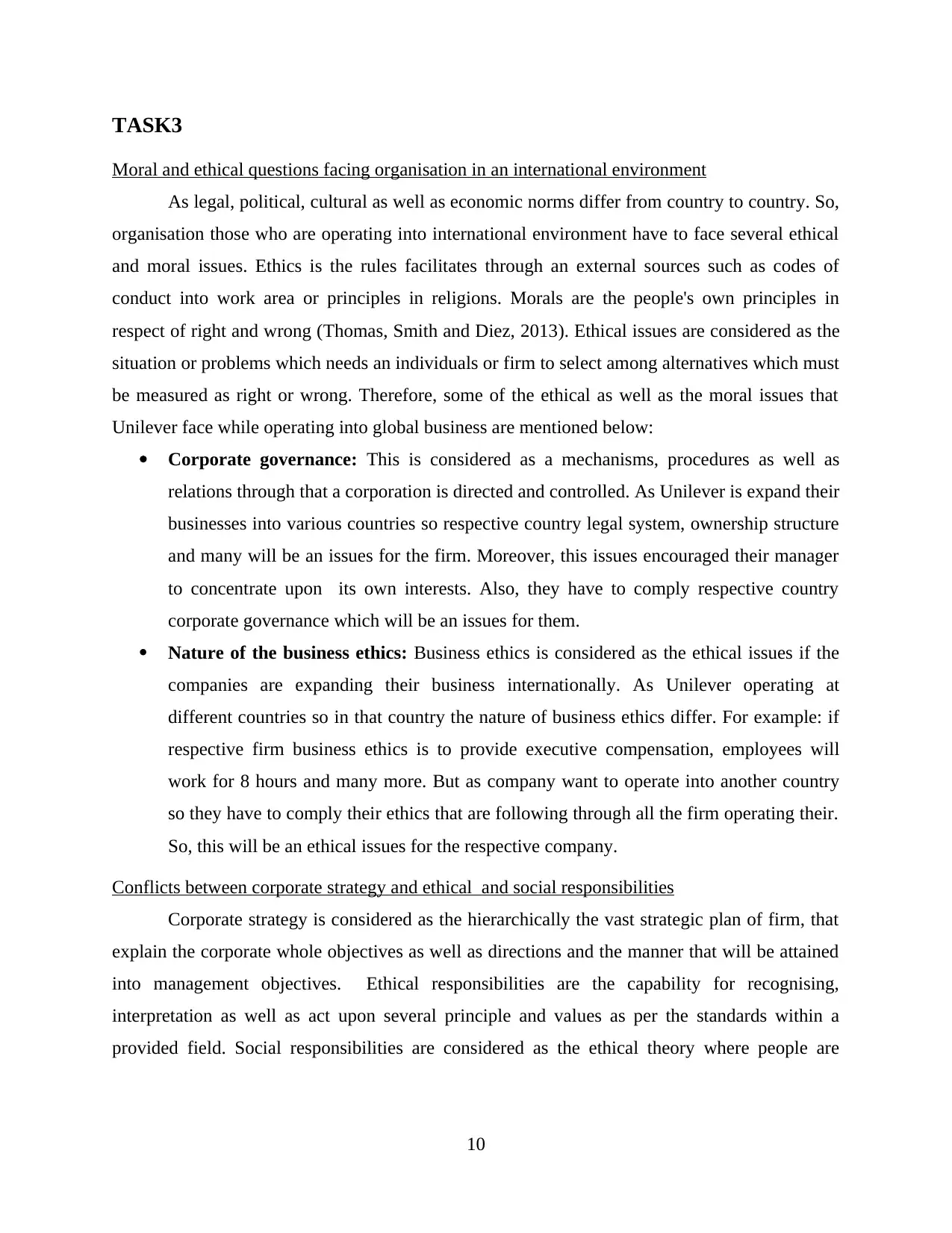
TASK3
Moral and ethical questions facing organisation in an international environment
As legal, political, cultural as well as economic norms differ from country to country. So,
organisation those who are operating into international environment have to face several ethical
and moral issues. Ethics is the rules facilitates through an external sources such as codes of
conduct into work area or principles in religions. Morals are the people's own principles in
respect of right and wrong (Thomas, Smith and Diez, 2013). Ethical issues are considered as the
situation or problems which needs an individuals or firm to select among alternatives which must
be measured as right or wrong. Therefore, some of the ethical as well as the moral issues that
Unilever face while operating into global business are mentioned below:
Corporate governance: This is considered as a mechanisms, procedures as well as
relations through that a corporation is directed and controlled. As Unilever is expand their
businesses into various countries so respective country legal system, ownership structure
and many will be an issues for the firm. Moreover, this issues encouraged their manager
to concentrate upon its own interests. Also, they have to comply respective country
corporate governance which will be an issues for them.
Nature of the business ethics: Business ethics is considered as the ethical issues if the
companies are expanding their business internationally. As Unilever operating at
different countries so in that country the nature of business ethics differ. For example: if
respective firm business ethics is to provide executive compensation, employees will
work for 8 hours and many more. But as company want to operate into another country
so they have to comply their ethics that are following through all the firm operating their.
So, this will be an ethical issues for the respective company.
Conflicts between corporate strategy and ethical and social responsibilities
Corporate strategy is considered as the hierarchically the vast strategic plan of firm, that
explain the corporate whole objectives as well as directions and the manner that will be attained
into management objectives. Ethical responsibilities are the capability for recognising,
interpretation as well as act upon several principle and values as per the standards within a
provided field. Social responsibilities are considered as the ethical theory where people are
10
Moral and ethical questions facing organisation in an international environment
As legal, political, cultural as well as economic norms differ from country to country. So,
organisation those who are operating into international environment have to face several ethical
and moral issues. Ethics is the rules facilitates through an external sources such as codes of
conduct into work area or principles in religions. Morals are the people's own principles in
respect of right and wrong (Thomas, Smith and Diez, 2013). Ethical issues are considered as the
situation or problems which needs an individuals or firm to select among alternatives which must
be measured as right or wrong. Therefore, some of the ethical as well as the moral issues that
Unilever face while operating into global business are mentioned below:
Corporate governance: This is considered as a mechanisms, procedures as well as
relations through that a corporation is directed and controlled. As Unilever is expand their
businesses into various countries so respective country legal system, ownership structure
and many will be an issues for the firm. Moreover, this issues encouraged their manager
to concentrate upon its own interests. Also, they have to comply respective country
corporate governance which will be an issues for them.
Nature of the business ethics: Business ethics is considered as the ethical issues if the
companies are expanding their business internationally. As Unilever operating at
different countries so in that country the nature of business ethics differ. For example: if
respective firm business ethics is to provide executive compensation, employees will
work for 8 hours and many more. But as company want to operate into another country
so they have to comply their ethics that are following through all the firm operating their.
So, this will be an ethical issues for the respective company.
Conflicts between corporate strategy and ethical and social responsibilities
Corporate strategy is considered as the hierarchically the vast strategic plan of firm, that
explain the corporate whole objectives as well as directions and the manner that will be attained
into management objectives. Ethical responsibilities are the capability for recognising,
interpretation as well as act upon several principle and values as per the standards within a
provided field. Social responsibilities are considered as the ethical theory where people are
10
⊘ This is a preview!⊘
Do you want full access?
Subscribe today to unlock all pages.

Trusted by 1+ million students worldwide
1 out of 16
Related Documents
Your All-in-One AI-Powered Toolkit for Academic Success.
+13062052269
info@desklib.com
Available 24*7 on WhatsApp / Email
![[object Object]](/_next/static/media/star-bottom.7253800d.svg)
Unlock your academic potential
Copyright © 2020–2026 A2Z Services. All Rights Reserved. Developed and managed by ZUCOL.





